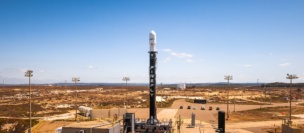Last Monday, Canaccord Genuity initiated coverage on Virgin Orbit (NASDAQ:VORB) with a ‘Buy’ rating and $20 price target. Shares of $VORB were $6.92 when Canaccord published its research. This morning, they sat at $6.57.
Defense: In the Feb. 28 note seen by Payload, CG Analyst Austin Moeller refers to the air launcher as an “emerging defense contractor” with flight heritage and a proven orbital-class rocket.
The hypersonic angle: “The Pentagon’s arms race with Russia and China to field hypersonic weapons provides LauncherOne with an exceptional market opportunity,” Moeller writes.
- With demonstrated speeds of close to Mach 23 (17,500 mph), LauncherOne could be used as a hypersonic target for missile defense tests or as an air-launched missile interceptor, CG speculates.
- LauncherOne’s $12M sticker price makes the rocket a “particularly affordable hypersonic vehicle” vis-à-vis the offerings of defense primes.
Launch anywhere: Moeller praises $VORB’s responsive launch capabilities—the modified Boeing 747 mothership and LauncherOne duo “should enable the company to scale more quickly and provide more rapid launch services relative to peers.”
- Progress (or lack thereof) on this front should be easy to judge in the coming years. It comes down to a simple question: Is Virgin launching from more runways around the world?
Services: $VORB is building out remote-sensing capabilities by striking partnerships with satellite companies (and taking stakes in the startups).
Big TAM: $VORBs’ total addressable market (TAM) is set to rapidly grow, with a large and sustained proliferation of smallsat (<600 kg) launches.
Still, Payload would caveat that third-party market forecasts don’t necessarily square with forward-looking projections outlined by $VORB. As we wrote in December, “per its Aug. investor presentation, Virgin Orbit expects to make $15M in 2021, $70M next year, $331M in 2023, and $2B+ in 2026 (a 133x jump over five years).”
Risk factors? We’ve paraphrased Moeller’s assessment of $VORB investment risks below, and provided additional comments in parentheses:
- Launch failure and destruction of customer/internal payloads
- Inflation and supply chain shortages on “materials purchasing and cost structure”
- Inflation, again, on employee comp and other operational considerations
- A potential near-term need to raise extra capital due to a high SPAC redemption rate. (NB: redemption rate = the percentage of shares redeemed by SPAC investors prior to a merger closing.)
- A military conflict that utilizes ASAT weapons that in turn generate a large amount of debris in LEO. (Any type of Kessler syndrome-type catalyst event should be considered a risk factor for commercial launchers and space actors, writ large).
- “Difficulty in achieving major customer wins and taking market share within the Space Solutions business for IoT, electro-optical, SIGINT, and hyperspectral satellite services.”
+ A final note: The accelerated decoupling of Russia-US space supply chains, driven by war in Ukraine, could boost the prospects of US commercial launchers that don’t require Russian-made engines or parts to fly.




